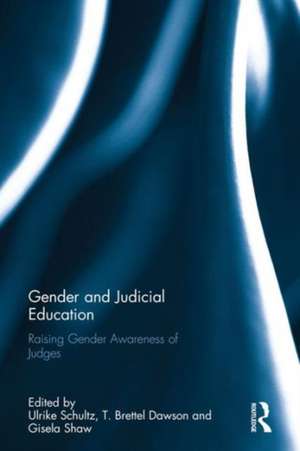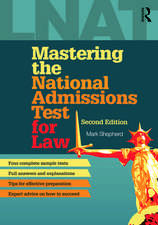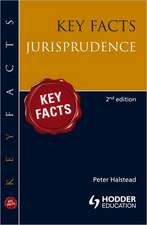Gender and Judicial Education: Raising Gender Awareness of Judges
Editat de Ulrike Schultz, T. Brettel Dawson, Gisela Shawen Limba Engleză Hardback – 10 oct 2016
These judicial education activities have generated a significant body of material and experience which it is timely to review and disseminate. Questions such as the following require answers. What is the current state of affairs? How is judicial education implemented in developed and developing countries all around the world? Who are the educators? Who is being educated? How is judicial education on gender regarded by judges? How effective are these programs?
The chapters in this book deal with these questions. They provide a multiplicity of perspectives. Six countries are represented, of these four are civil law countries (Germany, Argentina, Japan, Bosnia and Herzegovina) and two are common law countries (Canada; Uganda). This book was previously published as a special issue of International Journal of the Legal Profession.
| Toate formatele și edițiile | Preț | Express |
|---|---|---|
| Paperback (1) | 408.00 lei 6-8 săpt. | |
| Taylor & Francis – 8 ian 2019 | 408.00 lei 6-8 săpt. | |
| Hardback (1) | 999.46 lei 6-8 săpt. | |
| Taylor & Francis – 10 oct 2016 | 999.46 lei 6-8 săpt. |
Preț: 999.46 lei
Preț vechi: 1218.86 lei
-18% Nou
Puncte Express: 1499
Preț estimativ în valută:
191.31€ • 207.87$ • 160.80£
191.31€ • 207.87$ • 160.80£
Carte tipărită la comandă
Livrare economică 21 aprilie-05 mai
Preluare comenzi: 021 569.72.76
Specificații
ISBN-13: 9781138697409
ISBN-10: 1138697400
Pagini: 148
Dimensiuni: 174 x 246 mm
Greutate: 0.43 kg
Ediția:1
Editura: Taylor & Francis
Colecția Routledge
Locul publicării:Oxford, United Kingdom
ISBN-10: 1138697400
Pagini: 148
Dimensiuni: 174 x 246 mm
Greutate: 0.43 kg
Ediția:1
Editura: Taylor & Francis
Colecția Routledge
Locul publicării:Oxford, United Kingdom
Public țintă
Postgraduate and UndergraduateCuprins
Introduction: Gender and judicial education 1. Judicial education on social context and gender in Canada: principles, process and lessons learned 2. Neglect of gender questions at the vocational stage of judicial education in Uganda 3. Introducing gender training in judicial education in Japan to support the judiciary 4. Japanese judicial education: working toward gender equality in the judiciary 5. Gender stereotypes and attitudes within the judiciary of Bosnia and Herzegovina: a case for increased awareness and education 6. Gender training for the judiciary in Argentina 7. Raising gender awareness of judges – elements for judicial education in Germany 8. Judicial education on ‘gender awareness’ in Australia 9. Without fear or favour, affection or ill will: addressing gender bias in NSW judicial education
Notă biografică
Ulrike Schultz is retired Senior Academic at the FernUniversität in Hagen, Germany. She specializes in questions of gender and law, the sociology of the legal profession, and didactics and professional communication. She has taken part in many international socio-legal projects, and conducted large empirical studies on women lawyers and judges.
T. Brettel Dawson is an Associate Professor in the Department of Law and Legal Studies, Carleton University; Ottawa, Canada. She was associated with Canada’s National Judicial Institute between 1999-2016 and was its Academic Director and Director of Education. She is a past Co-editor of the Canadian Journal of Women and the Law.
Gisela Shaw is Emeritus Professor in German Studies, and has worked in philosophy, literature and legal sociology. She was awarded a personal chair at the University of the West of England (Bristol, UK), where she held the post of Director of Research for Modern Languages and European Studies.
T. Brettel Dawson is an Associate Professor in the Department of Law and Legal Studies, Carleton University; Ottawa, Canada. She was associated with Canada’s National Judicial Institute between 1999-2016 and was its Academic Director and Director of Education. She is a past Co-editor of the Canadian Journal of Women and the Law.
Gisela Shaw is Emeritus Professor in German Studies, and has worked in philosophy, literature and legal sociology. She was awarded a personal chair at the University of the West of England (Bristol, UK), where she held the post of Director of Research for Modern Languages and European Studies.
Descriere
Do judges need gender education? Why is it important? In what way has it to be done? The demand for gender equality in modern constitutions has created the necessity to integrate gender issues in judicial education. The ongoing feminization of the judiciary has sharpened the awareness for it. This books aims to deal with these issues from the perspective of many different law systems from across the world.














